The Fifth Amendment to the U.S. Constitution gives us the right not to serve as a witness against ourselves in a criminal case. In other words, witnesses don’t have to disclose evidence that could be used against him or her in court.
While we often see dramatic depictions of witnesses “pleading the fifth” on TV and in movies, there are a number of particular situations when it applies in real-world court cases, which I've summarized below.
If you are facing criminal charges in Wisconsin, contact Attorney Pat Stangl immediately to schedule a free consultation. Click here to schedule your consultation online.
Asserting the Fifth Amendment in Wisconsin Criminal Cases
Individuals may assert their Fifth Amendment privileges in a criminal proceeding by refusing to testify in their own case. It can also be invoked when an individual is called to the witness stand during someone else’s criminal trial if their testimony (answers to the prosecutor’s questions) could incriminate them.
Fifth Amendment protections don’t just apply to the crimes in question, but rather any crime an individual might have committed, even if it’s not involved in the case.
Asserting the Fifth Amendment in Wisconsin Civil Cases
This privilege can be used in civil cases, too. Civil cases don’t involve criminal penalties, but if someone’s testimony could lead to criminal prosecution, they can use their Fifth Amendment right to avoid incriminating himself or herself.
It’s important to understand that this protection does not apply to civil liability. In other words, if testimony could expose civil wrongdoing but not criminal liability, you may not assert this right.
Asserting the Fifth Amendment in Wisconsin Proceedings
There are a number of instances this protection can be invoked that don’t take place in a courtroom. These include:
- Testifying during an administrative law proceeding
- Investigatory proceedings
- Police questioning
- Depositions (oral statements by a witness taken before a trial, under oath)
Those facing both civil and criminal cases can invoke this protection as well. This right applies to both state and federal proceedings.
How to Test Whether or Not You May Assert the Fifth Amendment in Wisconsin
Unlike what TV shows and movies might suggest, individuals can’t simply assert this right for any statement they make. Here’s a simple test to see if it applies:
Do you reasonably believe the statement could be used in a criminal prosecution or lead to other evidence that could be used against you?
If the answer to a question posed by prosecutors could not help the prosecution in a criminal case against you, the protection does not apply. Also, if your answers could not help prosecutors in criminal prosecution because it’s run past the statute of limitations, you are not protected.
Lastly, if a witness has been granted immunity from prosecution, they cannot fear prosecution and therefore can be forced testify.
Asserting the Fifth Amendment in Wisconsin For Physical Testing
Courts have concluded that this protection can only be used for evidence obtained through communication. Thus, it does not apply to blood draws, fingerprints or DNA collection. Since these are not testimonial in nature, Fifth Amendment protection would not apply.
What Happens if You Take the Fifth in Wisconsin
In a criminal case, prosecutors cannot use the fact that someone invoked the Fifth Amendment to imply that they are guilty. However, doing so may influence jurors when deliberating the case.
In Wisconsin, statute 905.13(3) states, “[u]pon request, any party against whom the jury might draw an adverse influence from a claim of privilege is entitled to an instruction that no inference may be drawn therefrom.” In simpler terms, this means either party can request that the jury may not make inferences from someone using asserting their Fifth Amendment right. This does not apply to civil cases.
If you are facing criminal charges of any kind, do not risk self-incrimination. Contact an experienced attorney to advise you on exactly how to address questioning from police and prosecutors. Contact an experienced attorney today for assistance.
FREE 10-Minute Consultation
If you have been charged with a state or federal criminal offense, Attorney Pat Stangl is happy to extend to you, at no obligation, a FREE 10-minute consultation to discuss your case, explore your options and get you pointed in the right direction.
Stangl Law Offices, S.C.



